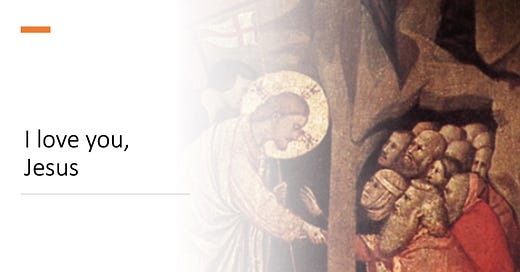Psalm 18:2-3a, 3bc-4, 47 and 51
Psalm 18 is introduced with the following superscription: “A Psalm of David, the servant of the LORD, who addressed the words of this song to the LORD on the day when the LORD delivered him from the hand of all his enemies, and from the hand of Saul” (Ps 18:1). A nearly identical variant of this song appears in 2 Samuel 22 right after the proper burial of “the bones of Saul and his son Jonathan” (see 2 Samuel 21:12-14), victorious fights against the Philistines (see 2 Sam 21:15-21), and before the last words of David (see 2 Sam 23:1-7).
In this thanksgiving song, the king declares God’s help in the fight against his enemies. It was God who thwarted all Saul’s attempts to put David to death and it was God who made David victorious in all his battles. Thus, the psalm begins with a declaration of the king’s love for God, “I love you, O Lord, my strength” and ends with acknowledging God’s faithfulness to His covenant “with David and his offspring forever” (Ps 18:51; see 2 Sam 7:1-17).
In Christian reading, this psalm is applied to David’s offspring, Jesus Christ, who fought against the forces of evil and death. On Good Friday, “the breakers of death encompassed” Jesus, “the cords of the nether world encircled” him, and “the snares of death overtook” our Lord (see Ps 18:5-6). From the cross, Jesus cried out to God, “My God, my God, why have you forsaken me?” (Ps 22:2; Matt 27:46) and “Father, into your hands I commit my spirit!” (Ps 31:6; Luke 23:46). Jesus cried to the Father who could save him from death and his cry reached the ears of the Father (see Heb. 5:7; Ps 18:7). On Easter morning, Jesus Christ came out of the tomb of death victorious and death has no more power over him (see Rom 6:9).
Therefore, Psalm 18 prophetically foreshadows the mystery of Christ's death and resurrection, and the salvation of humankind. The letter to Hebrews captures this mystery in this way: “Since therefore the children share in flesh and blood, [Jesus Christ] himself likewise partook of the same things, that through death he might destroy the one who has the power of death, that is, the devil, and deliver all those who through fear of death were subject to lifelong slavery” (Heb. 2:14-15).
The psalmist begins with a proclamation of his love for God: “I love You” (Ps 18:2). It is a declaration of love in return for love because God’s love always precedes our love. God’s love for us has been manifested in Jesus Christ - in his life and death. He loved us and gave himself for us (see Gal 2:20). He brought us victory over sin and death. He is our saviour, redeemer, deliverer. In him is our strength. Shall we also declare our love for Jesus? ‘I love you, Jesus, my Lord’.




